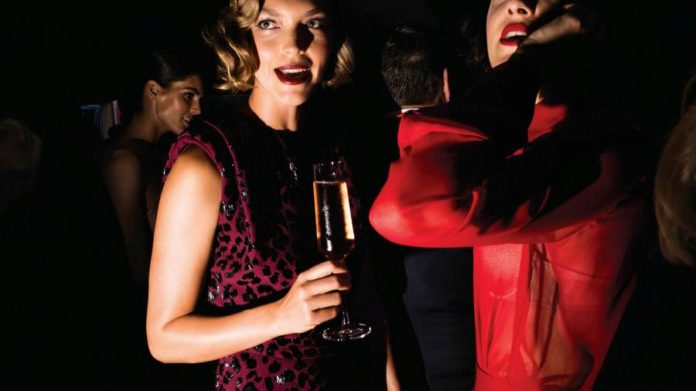My friend Katie throws the best parties. I might even describe her as the Gatsby of our circle — London fashion and magazine people, and those drawn to that scene — if it weren’t for the fact that rather than watching anonymously from afar, in the elusive manner of F Scott Fitzgerald’s master of ceremonies, Katie positions herself in the middle of the melee. Neither, despite her position as quintessential thrower of London soirées, can I see her as a 21st-century Mrs Dalloway, fussing over the flowers. Instead, I picture her on the dance floor, leading by example. The pied piper of good times.
What makes Katie’s parties so memorable, so convivial, so fun? They are infrequent enough to lend a sense of occasion to proceedings, but sufficiently reliable, and spectacular, to offer reassurance; you just know you’re going to enjoy yourself. They offer the crucial mix of people: just enough familiar faces, those you know and want to talk to, plus plenty of intriguing strangers.
As with so much else that is not fundamentally quite boring (press-ups, baking, watering plants, etc), Katie’s parties were put on hold in early 2020, along with everyone else’s. And then, this September, she sent out invitations. I hadn’t been entirely housebound for the previous 18 months — I’d walked the dog, and sat outside the pub, and jogged along the river — but for me this would be a return, for the first time in a long time, to partygoing.
I confess that, while I accepted swiftly, when the time came to leave the house — on a Sunday evening — I hesitated. There was an unfamiliar knot in my stomach. I worried that hibernation had altered me. I had become a homebody, fully domesticated. The dog, unaccustomed to my leaving the room, let alone the building, without him under almost any circumstance, looked at me askance. Where on earth was I going at such a time as this?
Not only where was I going, but why? Why would a person choose to leave the bosom of his loving family and the comforts of home on a Sunday evening? What possible benefit could be derived from attending a shindig that would surely result in social embarrassment, not to mention a colossal hangover?
I imagine this feeling is shared by many, this week more than ever. The fact is that our shut-in days are over, at least for now (and at least if you’re vaccinated, and not clinically vulnerable). The world is reopening, and that means not only a return to old routines and institutions but also to social occasions. It won’t have escaped your notice that Christmas party season will soon be upon us. Perhaps you’ve had invitations already? How do you feel about that? Are we to be Scrooges or Fezziwigs? In my case, I very much hope the latter. But still there’s that gnawing anxiety. Are we ready to face the world again? And what will be the new rules of partygoing in a post-pandemic age?
That Sunday night in September in the back of the Uber, staring into the brightly lit windows of passing houses and flats, I felt horribly out of practice. I stopped at a pub and swallowed a stiff drink. On the door, I held up my phone to present evidence of a negative Covid test, taken that day, and plunged in. The bar was rammed. I couldn’t see anyone I knew. And then, out of the scrum, a friendly face. We spent a few tentative seconds mulling over the sudden, alienating strangeness of the situation, but then the drinks arrived, and the old engine sparked into life, and the night took on a logic of its own.
In October, something changed. The great return began. Offices reopened for business. Restaurant reservation lines jammed. The lights went up on theatres and concert halls. In London, we began to play our old game of sardines on the Tube. In the evenings, in Soho and Shoreditch and the places people gather to enjoy themselves, streets are filled with revellers. Good luck trying to hail a taxi, in the rain, at closing time, as I did on a recent Wednesday night. After a while, I gave up and schlepped, sodden, to the Underground. In the old days (2019) this would have been a cause for fist-shaking and foul language. This time it felt great. London was remembering herself. It was good to be home.


If socialising and entertaining hasn’t quite returned to pre-pandemic levels, then certainly we have come a long way in a short period. In the past month I’ve been to restaurants, and concerts, and the ballet, and the theatre, and the cinema, and the pub, and other people’s houses. And parties, I have been to parties. Book parties, launch parties, dinner parties, leaving parties, birthday parties, office parties, after-parties, after-after-parties.
It’s not just me, and it’s not just London. My friend Euan is a British investment banker in Manhattan, and an unrepentant creature of the night — a character from Tom Wolfe, maybe, or Jay McInerney.
Earlier this week I asked Euan if he’d missed parties during the New York lockdown. “Of course I’ve missed parties!” he said. “The pandemic was, for me, the most profound, prolonged bereavement. Parties are life. But some of my friends started entertaining confidently, and early, as soon as the lockdowns lifted.” In recent months, Euan said, a fellow New York banker, Boykin Curry, has thrown “notably, consistently good parties” filled with “writers, smart politicians, business leaders, musicians and attractive, well-dressed young people”.
New York, Euan reports, “is absolutely coming back to life”, although “people seem to be behaving more as if they come from Kansas City. Dinner at 7pm. Apart from me. I can now get a table anywhere at 9pm.” Better yet, the city’s new mayor, Eric Adams, is, Euan notes approvingly, a “party animal”.

I wondered why parties are so important to Euan. He is successful in business. He is married. He has kids. What’s with the constant carousing? Parties, he said, are “a chance to let my hair down. To prove I’m not just a boring, typical banker.” Parties, he said, gave him the opportunity to leave behind the formality and conservatism of his working life. Parties were where he could “test mildly provocative opinions, measure my sadly dwindling flirting skills. And show off.”
Are there new rules for parties, post-pandemic? “You can’t go anywhere without showing your vaccine card,” Euan said, before advising his fellow ravers to “maybe tone it down a bit, at least in public”. Behind closed doors, though, his mantra remains: “Live and let live. Rage and let rage.”
“I hosted a very fun dinner 10 days ago,” he said. “Six of the 13 guests, all double vaxxed, subsequently tested positive for Covid. Not much fun. But the only question in the follow-up: ‘When are we having the reunion?’”
There are new rules, of course. How could there not be? Splitting a cigarette is out. Buffets and sharing plates are a no-no. Air kissing is OK, at a distance. (Fashion people have always been good at this, not wishing to smudge their make-up.) Elbow bumps still take preference over handshakes. Frequent sanitising is appreciated. Regular testing is only polite. But, at least in my experience, dressing up is still very much encouraged.


Although, sign of the times: there is a very 2021 coda to Euan’s story. “Last night,” he told me, “I co-hosted a screening and a dinner party with Peggy Siegal for the Leonard Bernstein movie at Soho House.” (That is an extremely Euan sentence right there, as they say in NYC.) “I had to miss it, my own party, isolating.”
New York has been ahead of London and the rest of the UK in loosening lockdown restrictions. But, if anecdotal evidence is to be believed, we are fast redressing the balance. Another friend, Ed, lives in Manchester. Ed is a prominent journalist and author, a serious man of letters who, like reporters of previous generations, combines dedication to his craft with an appetite for merrymaking. Ed loves a party. Like Euan, he took the ban on socialising hard. I emailed to ask if things were looking up. They were. “I’m making up for lost fun,” he wrote back. (He was on a tram.)

I wanted examples. “One of the happiest nights of my life happened in quite ordinary circumstances this summer,” he wrote, “just after most strictures were loosened. I joined about 30 of my friends in the garden of a restaurant, for no other reason than we were allowed. We had the place to ourselves. We drank champagne, ate steak, talked rubbish. When the restaurant politely ejected us at midnight, we continued at my house until very late. My eight-year-old eventually came downstairs to tell us to turn the music down. After uncountable days of lockdown, it all seemed like a miracle.”
What added piquancy to the party, Ed said, was that, during their celebration, “lingering in the background was the thought that we might not get another chance to have fun for a while. That fear has magical properties, because all great parties have the same thing in common: everyone has pushed their chips into the centre of the table.”
Exactly right. Parties demand commitment. You get what you give. The time, I think, has come again, to go all in.
“Masked parties, Savage parties, Victorian parties, Greek parties, Wild West parties, Russian parties, Circus parties, parties where one had to dress as somebody else, almost naked parties in St John’s Wood, parties in flats and studios and houses and ships and hotels and night clubs, in windmills and swimming-baths, tea parties at school where one ate muffins and meringues and tinned crab, parties at Oxford where one drank brown sherry and smoked Turkish cigarettes, dull dances in London and comic dances in Scotland and disgusting dances in Paris . . . ”
That, as every well-read reveller surely knows, is Evelyn Waugh, from Vile Bodies, his effervescent satire on the Bright Young Things, those libertines of the 1920s.

Our present decade, you will remember if you search your dimmest and most distant memories, was heralded, a scant two years ago, as a likely rerun of the Roaring Twenties. Like latter-day Daisies and Jays, we were all set to dance ourselves silly, high on fizz.
So far, it hasn’t worked out that way. But there is time. Most decades don’t really get going, don’t become fully themselves, until they are well under way.
As I prepared to press “send” on this story, my phone buzzed with a WhatsApp from my friend Laura. It was a photo of her as a child beneath the sentence: “Join me for my belated 50th (Plus One Year).” Then, the details: a famous Soho nightspot, next Friday, from 6pm until whenever. I replied succinctly: “Bring it on.”
Alex Bilmes is editor in chief of Esquire
Follow @ftweekend on Twitter to find out about our latest stories first
Credit: Source link































